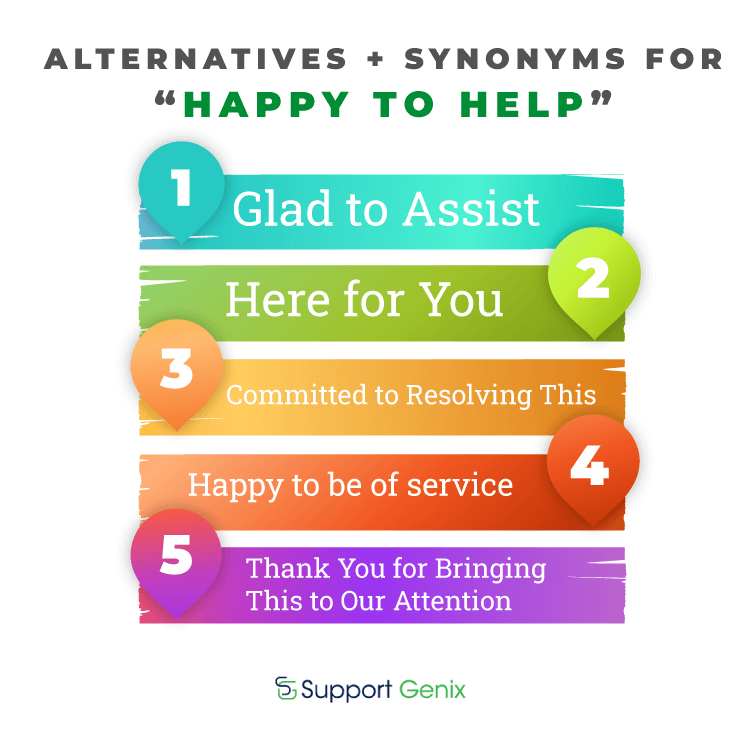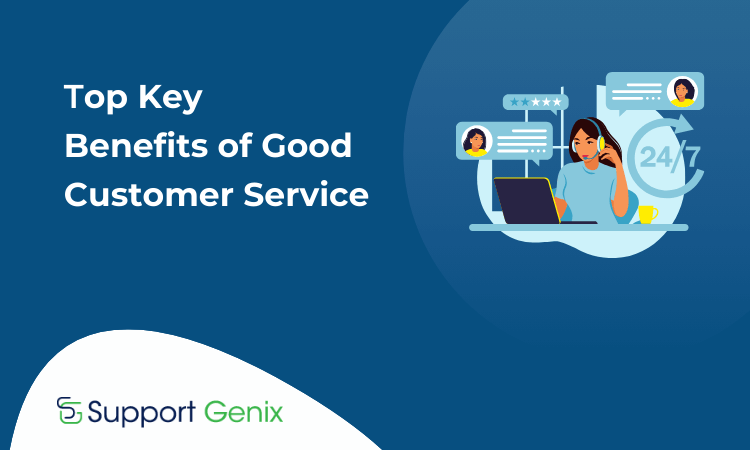5 Great Alternatives + Synonyms for “Happy to Help”
Are you tired of using the same old phrase, “happy to help,” in customer service interactions? It’s time to enhance your replies and introduce a personalized element to your customer support strategy. In this blog post, we’ll explore five great alternatives and synonyms for “happy to help” that will elevate your customer service experience.
From expressing genuine gratitude to offering ongoing assistance, these phrases will ensure your customers feel valued and understood. Let’s dive in and discover how you can take your customer interactions to the next level!
Support Genix
WordPress Support Ticket Plugin
Take Your Customer Support to The Next Level and Boost Customer Satisfaction Rates
The meaning of “Happy to Help” and why we need Alternatives
“Happy to Help” is all about being there for customers with a smile. But sometimes, one size doesn’t fit all. That’s why we offer alternatives. Some folks like sorting things out, while others prefer a friendly chat or a quick call. Giving options means everyone gets the help they need in the way they like it.
Whether it’s DIY solutions, chatting with us, or picking up the phone, we’re here to ensure every customer leaves happy. Customer support is not just about saying we’re so glad to help-it’s about making sure we mean it every time.
How to stop saying “happy to help”
Breaking the habit of saying “happy to help” can be challenging, but with some strategies, you can make the switch smoothly:
Pre-shift pep talk: Before starting your shift, motivate yourself to be fully attentive and customer-focused. Remind yourself to avoid default responses and instead engage genuinely with each customer.
Pause and Reflect: When you notice you’re about to say, “Happy to help,” stop for a moment. Consider different phrases or responses that could convey the same sentiment.
Involve the customer service manager: Managers can be supportive by gently encouraging the team to diversify their responses when assisting customers. Their guidance can reinforce the importance of using alternative phrases.
Create a cheat sheet: Compile a list of new phrases and keep them handy on a sticky note. This is a reference to help you vary your language and maintain a fresh, engaged tone in interactions.
Self-correction: Whenever you catch yourself about to say “happy to help,” consciously choose one of the alternative phrases you’ve practiced. Over time, this self-correction will help break the habit of defaulting to “happy to help.”
Recommended Blogs for You:
👉 Top Customer Support Tools Every Business Needs
👉 Tips to Improve Your SaaS Customer Support Strategy
👉 Dos and Don’ts of Effective Customer Support
👉 How to Hire a Customer Support Representative
👉 The Top Features to Look in WordPress Support Ticket Plugin
5 Alternatives for “Happy to Help” with Example

1. Glad to Assist
This phrase shows a friendly approach to helping customers, highlighting eagerness and being prepared to offer customer support. It reflects a genuine interest in aiding the customer’s needs, fostering a positive interaction. For instance, when assisting a customer with a query, you can say, “I’m glad to assist you with that. Let me check the details for you”.
2. Here for You
This expression underscores a sense of reliability and dedication to the customer’s satisfaction. It reassures the ongoing customer support and availability, creating a sense of trust and connection. When acknowledging a customer’s preference, you can respond with, “Absolutely, we’re here for you whenever you need assistance”.
3. Committed to Resolving This
This phrase conveys a proactive approach to problem-solving and emphasizes determination to address the customer’s concerns. It instills confidence in the customer that their issue will be tackled effectively. For example, when a customer raises a complaint, you can assure them by saying, “Rest assured, we’re committed to resolving this matter as quickly as possible.
4. Happy to be of service
This statement reflects gratitude for the opportunity to assist the customer while maintaining a customer-centric focus. It acknowledges the customer’s trust and aims to reinforce a positive relationship. After assisting, you can express, “I’m happy to be of service. Please feel free to reach out if you require further assistance”.
5. Thank You for Bringing This to Our Attention
This expression acknowledges the customer’s feedback and demonstrates appreciation for their proactive communication. It signifies a commitment to addressing concerns and improving service quality. Upon receiving a customer’s report of an issue, you can respond, “Thank you for bringing this to our attention. We’ll investigate and ensure it’s resolved promptly”.
Choosing the Right Response for Every Scenario
Choosing the right response for every scenario in customer service is crucial for ensuring customer satisfaction and resolving issues effectively. It involves understanding the customer’s needs, emotions, and the context of their inquiry or concern. Here are some key considerations for selecting the appropriate response:
Listen actively: Take the time to fully understand the customer’s issue or question before formulating a response. Active listening allows you to empathize with the customer and respond in a way that addresses their specific needs.
Empathize with the customer: Acknowledge the customer’s feelings and demonstrate empathy towards their situation. Empathetic responses help to build trust and rapport with the customer, even if you cannot immediately solve their problem.
Tailor your response: Customize your response to fit the individual customer and their unique circumstances. Avoid generic or scripted responses, as they can be insincere or unhelpful.
Be clear and concise: Provide clear, straightforward answers or solutions to the customer’s inquiry. Avoid using jargon or technical language that the customer may not understand.
Offer options: Whenever possible, provide the customer with options for resolving their issue or meeting their needs. Empowering customers to choose from different solutions can increase their satisfaction and sense of control.
Stay positive: Maintain a positive and professional tone in customer interactions, even when dealing with challenging situations. Positivity can diffuse tension and create a more pleasant experience for both parties.
What is the Power of Positive words in Customer Service?
Positive words wield significant power in customer service. They shape the entire customer experience and influence customer satisfaction, loyalty, and brand perception. Using positive language helps customer service representatives create a friendly and supportive environment, which builds trust and connection with customers.
Positive words convey empathy, understanding, and a genuine desire to help, which can reduce customer frustration and enhance problem-solving. Moreover, positive language has a contagious effect, uplifting customers and representatives alike, leading to more constructive interactions and outcomes.
Overall, the power of positive words lies in their ability to create meaningful connections. It enhances the customer experience, ultimately driving business success through customer loyalty and advocacy.
How the right words and phrases can enhance customer satisfaction and loyalty
The right words and phrases serve as powerful tools in enhancing customer satisfaction and fostering loyalty in several ways:
Personalized Communication: Tailoring language to customers’ needs and preferences demonstrates attentiveness and care, making customers feel valued and understood.
Positive Interaction: Using friendly and positive language promotes a welcoming and pleasant customer experience. This approach encourages repeat business and generates positive word-of-mouth recommendations.
Empathy and Understanding: Expressing empathy and understanding validates customers’ emotions, building trust and rapport. It also eases tensions in challenging situations, fostering a positive environment.
Effective Problem-Solving: Clear, reassuring language ensures customers’ issues are addressed promptly and efficiently. This boosts confidence in the company’s problem-solving capabilities effectively.
Gratitude and Appreciation: Expressing gratitude for business, patience, and feedback fosters customer appreciation and connection. This strengthens bonds, increasing chances of repeat purchases and long-term loyalty.
5 Common Customer Service Phrases to Avoid
In the realm of customer service, communication is key. However, certain phrases can inadvertently undermine the customer experience, leaving clients unheard or dissatisfied. Here are five common customer service phrases to avoid, along with tips on how to replace them with more effective alternatives:
- “I don’t know”: Instead, offer to find out or direct the customer to someone who does.
- “That’s our policy”: Instead, explain the reasoning behind the policy and explore possible solutions within those boundaries.
- “You’re wrong”: Instead, validate the customer’s perspective and work towards a resolution collaboratively.
- “Calm down”: Instead, acknowledge the customer’s emotions and reassure them that you’re there to help.
- “It’s not my fault”: Instead, take ownership of the issue and focus on finding a solution rather than assigning blame.
Support Genix
WordPress Support Ticket Plugin
Take Your Customer Support to The Next Level and Boost Customer Satisfaction Rates
Frequently Asked Questions
Q. What are power words in customer service?
A: Power words in customer service are chosen to create positive emotional responses. They build trust, evoke empathy, and encourage satisfaction among customers effectively.
Q: Why should customer service teams avoid using “Happy to Help”?
A: Customer support teams should avoid “Happy to Help” as it has become overly used, seems to lack sincerity, and fails to convey genuine care for customers’ needs.
Q: What is a synonym for “happy to help”?
A: Synonyms for “happy to help” include phrases like “Glad to assist,” “Delighted to support,” or “Here for you,” which add variety and warmth to customer interactions.
Q: Is saying my pleasure professional?
A: Saying “My pleasure” in customer service conveys professionalism and genuine care. It signifies a commitment to service excellence, enhancing customer satisfaction and loyalty.
Conclusion
In conclusion, exploring alternatives and synonyms for “Happy to Help” opens up possibilities in customer service interactions. By diversifying our language and responses, we can infuse our interactions with authenticity, empathy, and a genuine desire to assist.
Whether expressing gladness for problem resolution, assuring ongoing support, or inviting further questions, each alternative brings its unique touch to customer service. Embracing these alternatives enriches customer experiences and fosters stronger connections and trust.

